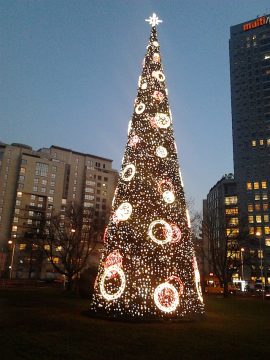
So once again we are into the winter holiday season, and once again the controversy continues regarding the use of “happy holidays” versus “merry Christmas”. Here’s a recap of the many posts I’ve made over the years on the topic:
- Revisiting the “war on Christmas”
- Happy holidays, and the reasoning behind my use of the phrase
- The “Happy holidays” post for 2016: thoughts on the past and wishes for the future
- “Happy Holidays” redux
- Why I say “Happy Holidays”
Why this still comes up, year after year, is a mystery to me. In fact, this year my Facebook feeds have been flooded with this particular piece of digital dung:

A better way to say this is “It’s not Happy Holidays, it’s Merry Christmas if you are Christian.” From this christianwebsite.com article, 31% of the world’s 7.8 billion people identify as Christian. That means that 69% of the world’s population is not Christian and that 69% identifies with some other religion or worldview, whether a different theistic religion or a completely secular system of beliefs. It’s possible even some of that 31% don’t observe the current, modern, commercialized version of Christmas, and some of the other 69% observe the general “spirit of Christmas” as an occasion of exchanging gifts and similar festivities, and go along with continuing to call it Christmas to avoid “making waves”. Indeed, the past posts where I discuss the so-called “war on Christmas” show just how volatile this situation has been in years past.
I think I said it best back in 2013, the last of the posts linked above (with a couple of potential errors which I will note below):
I usually say “Happy Holidays” and I do so to include everyone, whether they observe Yule, Litha, Christmas, Kwanzaa, Hanukkah, Zarathosht Diso, Grav-Mass, Saturnalia, or something else entirely. To many non-Christians, “Merry Christmas” has about as much meaning as “Happy Yule” or “Io Saturnalia” does to Christians. Seriously, try wishing someone “Happy Yule” or “Io Saturnalia” and see how they react.
This, by the way, is nowhere near an exhaustive list. Indeed, the secular/atheist/humanist gathering I recently attended branded itself as a “winter solstice party” which is not on this list as such. (That particular party, by the way, was a great excuse to try a Moscow Mule, which is now my favorite cocktail at least for the moment.)
Regarding the apparent errors:
- Apparently the correct name/spelling of the Zoroastrian winter holiday is Zartosht No-Diso. I’m not sure where I got the original from.
- Litha perhaps shouldn’t be on this list as it is a midsummer festival, though perhaps it may be observed by pagans and others in December in the Southern Hemisphere (Australia, most of South America and Africa, etc). I have retained it for the moment with that note.
While it is still as of now a work in progress, the current version of what I intend to be a near-exhaustive list of late November to early January winter holidays reads as follows:
- Christmas, Christians (including Protestant denominations and Catholics), December 25
- Kwanzaa, African diaspora, December 26 – January 1
- Hanukkah, Jewish, 25th of Kislev on the Hebrew calendar (November/December)
- St. Lucia’s Day, Sweden/Norway/Finland, December 13
- Las Posadas, Mexican, December 16-24
- St. Nicholas Day, northern Europe, December 6
- Mardi Gras, January 6
- Boxing Day, UK/Europe, December 26
- Yule, Germanic pagan origin but observed by some modern pagans and LaVeyan Satanists, usually December 25
- Grav-mass (Isaac Newton’s birthday), December 25
- Yaldā Night/Chelle Night, Persian origin, Iran/Iraqi Kurdistan/Afghanistan/Azerbaijan/Turkiye, December 20, 21, or 22 (winter solstice)
- Quaid-e-Azam’s Day/Jinnah’s Birthday, Pakistan, December 25 (may be observed alongside Christmas)
- Chalica, Unitarian Universalists, seven days starting with the first Monday in December (some observe a seven-week variant starting in January)
- Zartosht No-Diso, Zoroastrians, December 26
- Litha, neo-pagans in the Southern Hemisphere, December 25 (unconfirmed)
- Saturnalia, ancient Roman origins with modern observance unknown, December 17-23
There are undoubtedly others, and I look forward to finding new entries to this list for next year.
In closing, happy holidays and merry wishes to all. I am looking forward to an even better year in 2024.
